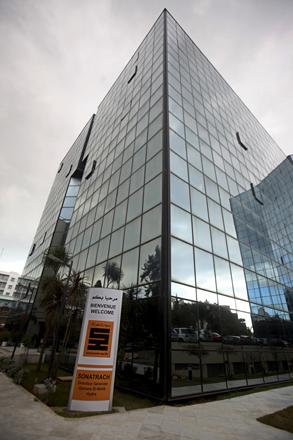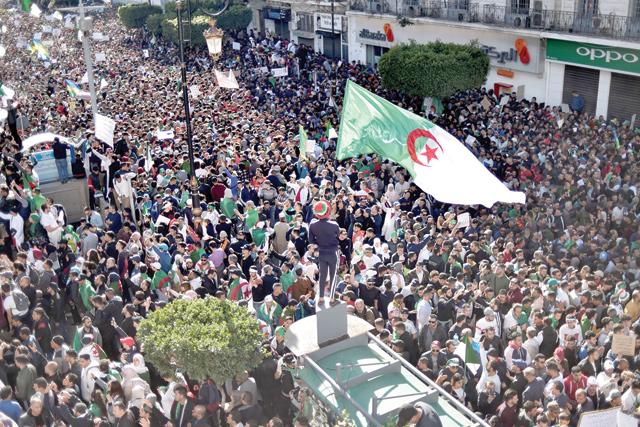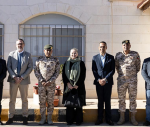You are here
Oil revenues down, Algeria woos energy investors
By Reuters - Mar 22,2016 - Last updated at Mar 22,2016

A general view of the headquarters building of Algerian state energy company Sonatrach in Algiers, on February 8, 2015 (Reuters photo)
ALGIERS — After a deep slide in oil prices, Algeria's Sonatrach is shifting strategy to offer foreign firms direct negotiations to buy stakes in 20 oil and gas fields in a bid to attract investors and increase output, a source at the state energy company said.
The campaign to bring in energy investment comes at a crucial time for the North African producer, a member of the Organisation of Petroleum Exporting Countries (OPEC), as it tackles lower revenues and stagnating production.
Algeria, a key gas supplier to Europe, is also in talks with European Union (EU) officials on holding a summit in Algiers in May that will discuss energy investment opportunities in Algeria as EU leaders look to diversify from Russian gas.
The switch to bilateral deals follows two energy bidding tenders that failed to attract much interest. A bid scheduled for last year was cancelled because of low crude prices.
"Direct negotiations are a more efficient, less expensive, a faster, and a less bureaucratic approach," the Sonatrach source said of the talks. "Sonatrach is already in negotiations with ENI and several other foreign firms."
The source did not give details of the other firms and ENI declined to comment. The stakes being sold are expected to leave Sonatrach the majority holder as Algerian law dictates.
The 20 fields, which the source said Sonatrach took over from state hydrocarbons agency ALNAFT in September as part of the streamlining process, include oil and gas fields across the centre and south of the country in places such as Ouargla and Adrar provinces, and Illizi near the Libyan border.
As part of the campaign, Sonatrach chief, Amine Mazouzi, will travel to China at the end of the month for meetings with Chinese oil companies SINOPEC and CNPC, which are already operating in Algeria.
Algeria's energy potential is not in doubt, but oil executives say tough terms on production-sharing contracts, bureaucracy and other problems, such as customs delays and archaic banking systems, make the country a less attractive prospect.
Reforms to open up the and gas sector to foreign investment in 2005 were reversed a year later, adding a windfall tax and more Sonatrach control, when oil prices were high and Algeria's reserves were in good shape.
Security is also a factor after the 2013 attack on the In Amenas plant run by BP and Statoil with Sonatrach in which 40 oil workers died. BP and Statoil on Monday said they were reducing staff in Algeria after rockets hit another gas plant last week.
Oil executives said bilateral contracts may offer flexibility, but Algeria's legal framework and red tape remained a major concern for some companies and it was still unclear what terms Sonatrach would be offering.
"They will need to change the contract terms in order to get real investment," said one oil executive with Algeria experience.
Squeezing more out
Reliant on its mature fields, Algeria's output as been declining for a decade. It peaked at 233 million tonnes of oil equivalent in 2007, before dipping to 187 million tonnes by 2012. Last year it was estimated at 190 million tonnes, but the government sees it at 224 million tonnes by 2019.
Sonatrach is now focussed on maximising output at its mature fields and seeking foreign partners for technology. That effort centres on Hassi Massoud, Hassi Berkine and Illizi in the southwest and west. Japanese firm GJC last month won a $339 million deal to help increase production at Hassi Massoud.
Southern gas fields already in development with foreign partners are expected to come online through 2018 after delays in initial start-up dates, and the government has said it expects gas output to increase by 13 per cent by 2019.
After multiple delays, the In Amenas gas plant, which produced 11 per cent of Algeria's gas before the 2013 attack by militants, is expected to be back in full operation in April. That would bring its gas production from 16 million cubic metres a day to 20 million.
Bureaucracy, delays
Oil executives say beyond the tough financial terms and short exploration periods, other problems in Algeria can be traced back to bureaucracy, delays in data processing, and slow decision-making at Sonatrach and ALNAFT.
Mazouzi last October begun a restructuring aimed at saving money and streamlining bureaucracy to tackle the oil crisis. New assistants were put in charge of downstream, upstream, transport and pipelines, and commercial operations.
But the state company itself has been in constant flux, several former Sonatrach officials and analysts say, after four changes in top management and the loss of hundreds of technicians and engineers in recent years to overseas jobs.
Two corruption scandals and trials of former energy officials have also left Sonatrach ranks nervous and slowed decision-making, former company officials and executives said.
"Sonatrach is a huge company but it is not a great company," Said Beghoul, a former Sonatrach official who is now an oil consultant, said. "It is in serious need of reform."
At a North African oil conference in Algiers late last year, foreign executives repeatedly urged better incentives and flexibility while welcoming dialogue with the government to cut delays that can drag on for years. Even Algeria's energy minister last year called for Sonatrach to speed up work.
Those discussions may be reflected by ALNAFT, which is preparing for another bidding round in addition to Sonatrach's plans, according to the Sonatrach source.
That could be a more tailored process with fields open to only companies suited to developing them, one industry source said. But companies remain wary, with the most recent bid drawing only four deals even after changes in 2013 to oil laws to offer more incentives.
"Its fiscal terms are too tight expecially with oil prices as they are, it is not economic. How do you change that, by being creative," one oil executive indicated. "They are aware of that, they are trying to change."
Related Articles
ALGIERS — Algeria's state-owned hydrocarbon firm Sonatrach will invest $40 billion into oil exploration, production and refinement as well a
ALGIERS — Algeria's newly-appointed prime minister has started talks to form a new government, state media reported on Sunday, in a move des
ALGIERS — Algeria's state energy firm is ready to supply Europe with more gas in view of a possible decline due to the Russian invasion of U
















